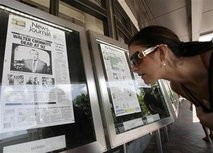
15 Jan 2011 04:06:18
Washington, Seattle, Minneapolis, Atlanta, and Pittsburgh, in that order, are the country's most literate, the study from Central Connecticut State University found.
It assessed the country's top reading cities in terms of newspaper circulation, number of bookstores, library resources, periodical publishing resources, educational attainment, and Internet resources.
"This set of factors measures people's use of their literacy and thus presents a large-scale portrait of our nation's cultural vitality," said Jack Miller, primary author of the study and Central Connecticut State president.
"From this data we can better perceive the extent and quality of the long-term literacy essential to individual economic success, civic participation, and the quality of life in a community and a nation," he said.
This long term view has researchers worried about current literacy trends. Newspaper readership and circulation has plummeted since the annual survey of most literate cities began in 2003, and bookstores are disappearing, the report said.
In Minneapolis, where there were 14 independent bookstores for every 10,000 people, there are now only six, while Boston has gone from nine per 10,000 to three. Nationwide the number has gone from nine to six.
While in cyberspace, online purchase of books is increasing, it is not making up for an overall decline in reading, the study suggests.
Online book purchases have grown in the survey by an average of 83 percent since 2007.
Researchers said public libraries have remained a bastion of literacy.
It assessed the country's top reading cities in terms of newspaper circulation, number of bookstores, library resources, periodical publishing resources, educational attainment, and Internet resources.
"This set of factors measures people's use of their literacy and thus presents a large-scale portrait of our nation's cultural vitality," said Jack Miller, primary author of the study and Central Connecticut State president.
"From this data we can better perceive the extent and quality of the long-term literacy essential to individual economic success, civic participation, and the quality of life in a community and a nation," he said.
This long term view has researchers worried about current literacy trends. Newspaper readership and circulation has plummeted since the annual survey of most literate cities began in 2003, and bookstores are disappearing, the report said.
In Minneapolis, where there were 14 independent bookstores for every 10,000 people, there are now only six, while Boston has gone from nine per 10,000 to three. Nationwide the number has gone from nine to six.
While in cyberspace, online purchase of books is increasing, it is not making up for an overall decline in reading, the study suggests.
Online book purchases have grown in the survey by an average of 83 percent since 2007.
Researchers said public libraries have remained a bastion of literacy.

